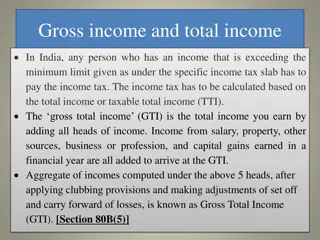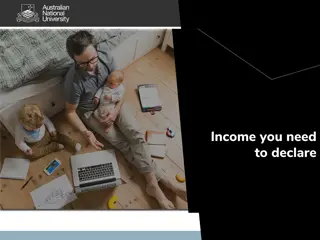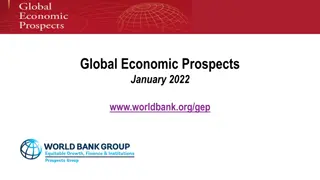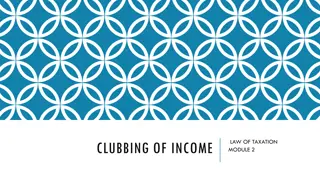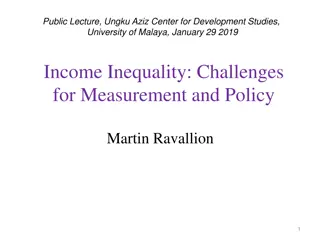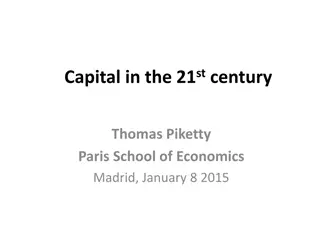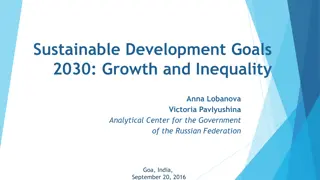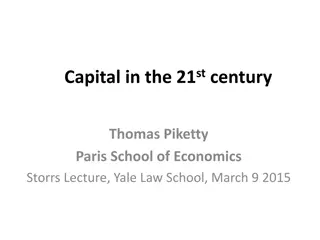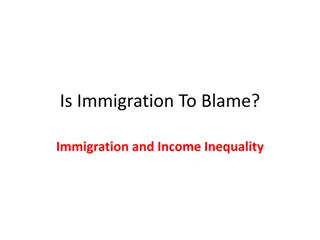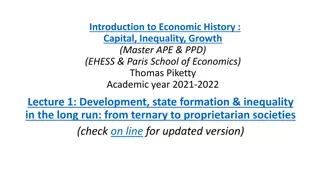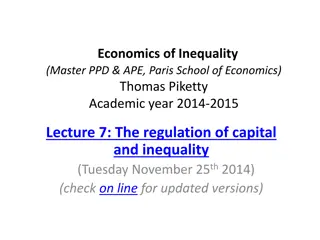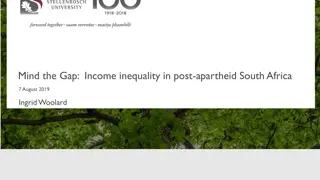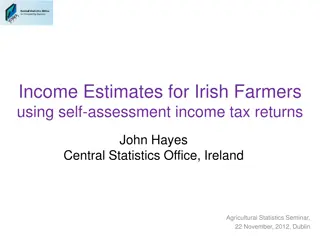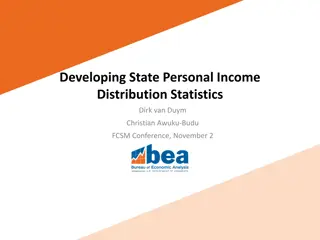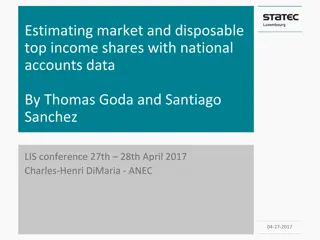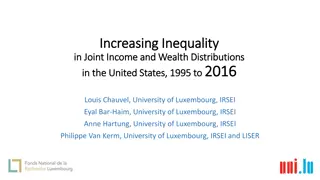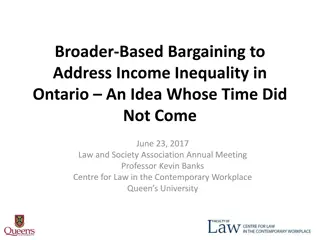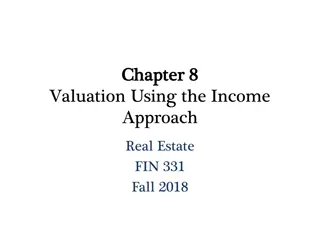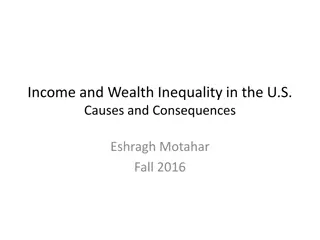Global Income Inequality: Causes and Consequences
Global income inequality is a pressing issue with significant societal implications. The distribution of income among populations reflects underlying causes and leads to various consequences. Explore the factors driving this disparity and the impacts it has on individuals and economies worldwide. From examining quintiles to considering different approaches to distributing resources, delve into the complexities of income inequality and its far-reaching effects.
Download Presentation

Please find below an Image/Link to download the presentation.
The content on the website is provided AS IS for your information and personal use only. It may not be sold, licensed, or shared on other websites without obtaining consent from the author.If you encounter any issues during the download, it is possible that the publisher has removed the file from their server.
You are allowed to download the files provided on this website for personal or commercial use, subject to the condition that they are used lawfully. All files are the property of their respective owners.
The content on the website is provided AS IS for your information and personal use only. It may not be sold, licensed, or shared on other websites without obtaining consent from the author.
E N D
Presentation Transcript
Global Income Inequality: What are the causes and consequences?
Income Inequality What is the first thing that comes to mind when What is the first thing that comes to mind when you hear/see this term? you hear/see this term? 2
Income Inequality Defined: Defined: the extent to which income is distributed unequally in a group of people. 3
$100 squares We are the country of We are the country of Econland Our GDP is $100 Our GDP is $100 All we produce is squares drawn on paper All we produce is squares drawn on paper Everyone draw a square! Everyone draw a square! Econland 4
How should we divide the $100? I represent I represent ALL How should How should we spend What suggestions do you have? What suggestions do you have? ALL consumers in consumers in Econland spend our money? Econland money? 5
How should we divide the $100? Which option did you like the best? Which option did you like the best? Which option seemed the most fair? Which option seemed the most fair? Which option seemed the most equal? Which option seemed the most equal? 6
The use of quintiles Income inequality is often discussed using Income inequality is often discussed using quintiles Imagine an entire population of 15 people lined up single file according Imagine an entire population of 15 people lined up single file according to how much income they have to how much income they have Quintiles split the population into 5 even groups based on numbers (3 Quintiles split the population into 5 even groups based on numbers (3 each in this case) each in this case) Lowest Income Highest Income 1st quintile 2nd quintile 3rd quintile 4th quintile 5th quintile 7
The use of quintiles While the number of people are the same, the amount of income they have can While the number of people are the same, the amount of income they have can be very different depending on how much income inequality there is be very different depending on how much income inequality there is Here is what Here is what Econland Econland looked like when everyone got paid the same for their looked like when everyone got paid the same for their squares. squares. 20% of income ($20) 20% of income ($20) 20% of income ($20) 20% of income ($20) 20% of income ($20) Lowest Income Highest Income 1st quintile 2nd quintile 3rd quintile 4th quintile 5th quintile 8
The use of quintiles However, THIS is more what However, THIS is more what Econland the squares they liked the squares they liked It was still $100, but it was distributed very differently It was still $100, but it was distributed very differently Econland looked like when consumers only bought looked like when consumers only bought 80% of income ($80) 0% of income ($0) 20% of income ($20) 0% of income ($0) 0% of income ($0) Lowest Income Highest Income 1st quintile 2nd quintile 3rd quintile 4th quintile 5th quintile 9
Income Inequality Around The World Your group has 5 cups, one for each of the 5 Your group has 5 cups, one for each of the 5 quintiles quintiles Using the information on your card, count out the Using the information on your card, count out the correct number of beans for each quintile (cup) correct number of beans for each quintile (cup) Each bean represents 1% of all the income for your Each bean represents 1% of all the income for your country country 10
Mystery Countries Revealed! Country A Argentina Country E Belarus Country B Sweden Country F Canada Country C South Africa Country G India Country D United States Country H Panama 11
Income Distribution and Equality Is income distribution only a problem in the Is income distribution only a problem in the United States? United States? What do Sweden and Belarus have in common? What do Sweden and Belarus have in common? Can we say that income equality is the same Can we say that income equality is the same thing as wealth? thing as wealth? 12
How to quantify income inequality Ratio method Divide the mean income of the 5th quintile by the Divide the mean income of the 5th quintile by the mean income of the 1st quintile mean income of the 1st quintile Example if the 5th quintile average income is Example if the 5th quintile average income is $2,000 and the 1st is $500, the income inequality $2,000 and the 1st is $500, the income inequality would be 4 (2000/500). would be 4 (2000/500). A ratio of 4, for example, would mean that the 5th A ratio of 4, for example, would mean that the 5th quintile is making 4 times more income than the quintile is making 4 times more income than the 1st quintile 1st quintile The higher the number, the more unequal 13
How to quantify income inequality Gini Coefficient A statistical equation that measures the A statistical equation that measures the distribution of income across the whole population distribution of income across the whole population Creates a scale of 0 (perfect equality) to 100 (one Creates a scale of 0 (perfect equality) to 100 (one person holds all the income). person holds all the income). The higher the number, the more unequal 14
Mystery Countries Gini Coefficients Country A Argentina 42.3 Country E Belarus 24.4 Country B Sweden 29.3 Country F Canada 33.3 Country C South Africa 63 Country G India 35.7 Country D United States 41.5 Country H Panama 49.8 15
Global income inequality exists. What are the causes and consequences? 16
Activity 10.2 After receiving your card (#1 After receiving your card (#1- -6) join a group of up to four students that have the SAME NUMBER as you four students that have the SAME NUMBER as you 6) join a group of up to You will have 10 minutes to read and discuss your card You will have 10 minutes to read and discuss your card with your group with your group WRITE YOUR ANSWERS to the questions on your sheet WRITE YOUR ANSWERS to the questions on your sheet 17
Ethical concerns of global income inequality. The following ethical frameworks that are key to the decision The following ethical frameworks that are key to the decision- -making process. Outcomes-based ethics: a moral philosophy that discerns right or wrong action a moral philosophy that discerns right or wrong action based on the consequences produced by the action. based on the consequences produced by the action. Virtue-based ethics: a moral philosophy that discerns right or wrong based on a moral philosophy that discerns right or wrong based on whether one s actions contribute to the formation of good character. whether one s actions contribute to the formation of good character. Duty-based ethics: a moral philosophy that discerns right or wrong based on a moral philosophy that discerns right or wrong based on the analysis of one s obligations. the analysis of one s obligations. making process. *Choose one framework and discuss with a neighbor how that framework might be applied to income inequality. 18
Activity 10.3 You will now regroup into groups of four with FOUR DIFFERENT You will now regroup into groups of four with FOUR DIFFERENT NUMBERS NUMBERS Preferably you will have two even number and two odd numbers Preferably you will have two even number and two odd numbers Evens are causes and odds are consequences Evens are causes and odds are consequences Start with the smallest number in the group and share your summary Start with the smallest number in the group and share your summary Ask each other questions and complete your chart Ask each other questions and complete your chart We will have a class discussion in about 10 We will have a class discussion in about 10 - - 15 minutes. 15 minutes. 19
Discussion Guide Question #1 Doctors sometimes choose between treating a Doctors sometimes choose between treating a disease (cause) or symptoms (consequences). If disease (cause) or symptoms (consequences). If you had to choose one thing from your list above you had to choose one thing from your list above to treat first, which would you prioritize and to treat first, which would you prioritize and why? why? 20
Discussion Guide Question #2 In a duty In a duty- -based ethics model, an action is determined to be right or wrong based on a based ethics model, an action is determined to be right or wrong based on a person s obligations. Given the causes of income inequality you have learned about today, person s obligations. Given the causes of income inequality you have learned about today, what is one group/organization/party that has taken an action that is part of the cause of what is one group/organization/party that has taken an action that is part of the cause of income inequality? What action have they taken (or not taken) that is contributing to income inequality? What action have they taken (or not taken) that is contributing to income inequality? income inequality? Did the group listed in the previous question (#1) bear any obligation regarding income Did the group listed in the previous question (#1) bear any obligation regarding income inequality? If so, what was that obligation? If not, should they be obligated to reduce it? inequality? If so, what was that obligation? If not, should they be obligated to reduce it? Under this ethical model, some people argue that global groups like the International Under this ethical model, some people argue that global groups like the International Monetary Fund and World Bank should be doing more to reduce income inequality Monetary Fund and World Bank should be doing more to reduce income inequality globally. Even if these kinds of groups were obligated to act in this way, what may be some globally. Even if these kinds of groups were obligated to act in this way, what may be some other ethical problems with having global organizations make policies for all countries to other ethical problems with having global organizations make policies for all countries to abide by? abide by? 21
Discussion Guide Question #3 In an outcome In an outcome- -based ethics model, an action is determined to be right or wrong based on based ethics model, an action is determined to be right or wrong based on the consequences produced by the action. the consequences produced by the action. Using at least one of the consequences you have learned today, explain why, under this Using at least one of the consequences you have learned today, explain why, under this model, income inequality can be considered unethical. model, income inequality can be considered unethical. Assume an action is taken and one consequence of this action is that income inequality is Assume an action is taken and one consequence of this action is that income inequality is reduced globally by 10%. Does it automatically follow that this was an ethical action? reduced globally by 10%. Does it automatically follow that this was an ethical action? Explain. Explain. 22
Create a Podcast Podcast Guest Assignment: You ve been invited to speak on an economics podcast on the topic of global income You ve been invited to speak on an economics podcast on the topic of global income inequality. inequality. The host is known for their The host is known for their free-market stances and has said multiple times that income inequality is inequality is simply unavoidable in the world as there are too many variables to try to in the world as there are too many variables to try to address. They argue that each country just needs to decide how much inequality they are address. They argue that each country just needs to decide how much inequality they are willing to accept. willing to accept. and has said multiple times that income They have asked you for a 2 They have asked you for a 2- -minute comment on the topic. You may agree or disagree minute comment on the topic. You may agree or disagree with the host, but you must use some of the causes and/or consequences you learned with the host, but you must use some of the causes and/or consequences you learned today to support your stance. today to support your stance. You may record your audio response and submit it to me via attachment or link or write it. You may record your audio response and submit it to me via attachment or link or write it. 23


